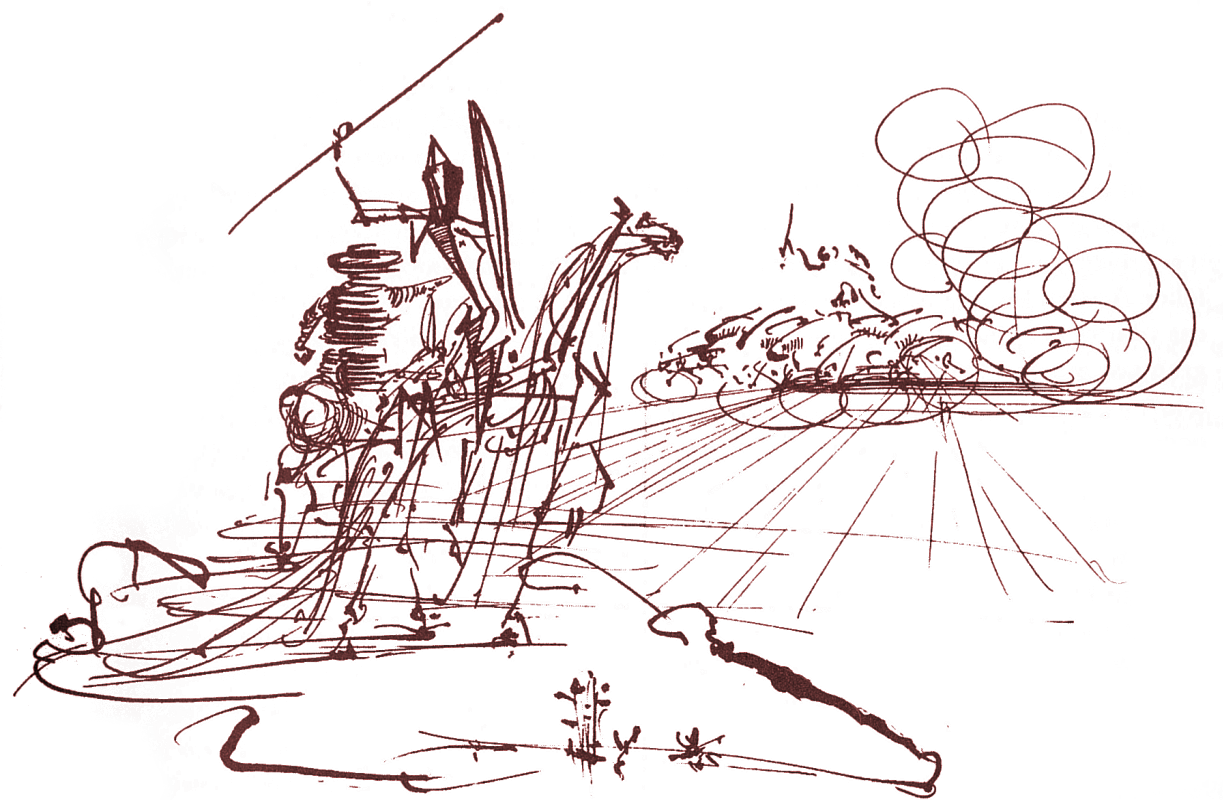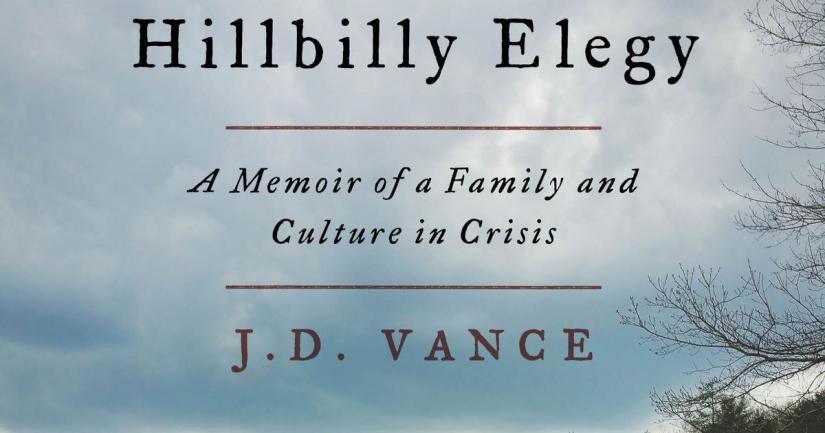J. D. Vance's memoir, Hillbilly Elegy: A Memoir of a Family and Culture in Crisis, bears witness to the hollowing-out of the American dream, close up and personal. His book will vaccinate you against the idea that whiteness per se is a winning lottery ticket, and it will help you see the people of all races who are struggling in the hollowed-out towns of the Rust Belt. (This review was originally published in The Englewood Review of Books)
Part life narrative and part sociological reflection, Hillbilly Elegy is a beautifully-written book, compelling and finely crafted. Throughout, Vance offers reflections on the causes of poverty rooted in his own life story, incorporating his family history, sociological research, and his observations of the people and places along his life journey as the son of a (mostly) single mother who was addicted to prescription drugs. This addiction ensured that the main source of stability in Vance’s life came from his mountain-tough grandparents.
Vance grounds his narrative first in his family, who migrated from Jackson Hollow, Kentucky, and weremembers of the famously violent Blanton clan. Even while self-critically swelling with a certain pride at the toughness of his family, Vance talks about the weight of continual quarreling on his psyche, a weight that continued to pull him back toward poverty. I will never forget some of the stories he tells—like how when a trucker called his uncle a "son of a bitch" (the second time), he pulled the trucker from the car, beat him within an inch of his life, and ran an electric saw up and down his body. Or when another uncle heard a man saying he'd like to eat his sister's underwear; and the uncle fetched a pair and made him eat it at knifepoint. Or how, when four-year-old Vance fell asleep on a church pew at a funeral and his grandparents couldn't locate him, they grabbed their guns and sealed off the two exits to the funeral parlor, searching each car as it left for kidnapping perverts. Fascinating stories like this pepper Hillbilly Elegy.
Yes, the Blanton clan was not to be messed with. That's why his grandparents left Appalachia: his 16-year-old grandfather (Papaw) had impregnated his 13-year-old grandma (Mamaw) and right about now was the time to get the hell away from the Blantons and move to faraway Middleton, Ohio. It was a good time to leave. Factories were luring Appalachian families north with promises of steady jobs and wealth.
But when young couples broke off from their networks of extended kin, they no longer had the support they were raised to depend upon. His Papaw drank and his Mamaw fought him with the tenacity of a wolverine. Once, she promised to kill him if he ever drank again. A woman of her word, when he next fell asleep drunk on the couch, she doused him in gasoline and lit him on fire. Only the quick action of her 11-year-old daughter saved him.
And so Vance's mother came out of that tempestuous family with a penchant for violent anger and abuse of the prescription drugs she lifted from her job as a nurse. She latched onto various men who played halfhearted father roles in Vance's life, only to disappear as the fights increased in volume.
But for Vance, poverty was about more than just money. Even when Papaw was rich enough to casually buy a brand-new Oldsmobile and then wrap it around a telephone pole during a bender, the stability of middle-class life was out of reach because of the emotional volatility they'd brought from Appalachia.
But there's much more to Vance's family than the stories a neighbor might relay to Child Protective Services. The tough fibers of salvation and hope run through his family: Papaw's recovery from alcoholism is proof. By the time his mother was totally out of control, his Mamaw and Papaw were solid people, hardworking and ferociously loyal. His Papaw taught him math. His Mamaw took him in during high school and gave him a stable place to live and make good grades. And his mother taught him the importance of intelligence. For Vance, the Scots-Irish extended family was a refuge when his mother lost the plot. A stable family member can be enough to give a young person a boost out of poverty and into self-determination.
After high school, Vance joined the Marines, which watered seeds of confidence and self-reliance that grew as he went on to Ohio State and later to Yale Law. He attributes his later success to the build-you-from-the-ground-up approach of the Marine Corps. Through all of it, Vance never truly felt like an outsider until he landed at Yale and encountered a culture where, he speculates, many of his friends may never have cleaned up after themselves, leaving them unable to empathize with the waiters and waitresses that bring them their food and clean up after them.
While he doesn't state this, I think Vance wrote the book in part to answer the personal question, "Why me? Why did I escape from poverty when so many do not?" And so he looks at the personal and familial choices that gave him the foundation necessary to navigate upward mobility.
Before reading this book, I did not recognize the link between poverty and the tenacity of Scots-Irish culture in the face of the homogenizing white culture, tenacity that made it into a permanent cultural underclass. Underlying the casual mockery of poor whites is the question, "Why can't these people just become white like everybody else?" Implicit in this is the assumption that not all white people are truly "white," though they can become so. Vance makes the point that class-based discrimination is a socially acceptable form of bigotry.
While the book includes light intersectional passages on race, I do think that the book suffers somewhat when it does not mention racism in the same breath as classism. That said, I do understand the roots of white poverty better than I did before reading the book, and that alone is worth the price of admission.
I picked up Hillbilly Elegy because I wanted to understand the rage of the white working class that has partly fueled the Trump phenomenon. As Vance said in the widely-read American Conservative article that prompted my interest, "The simple answer is that these people – my people – are really struggling, and there hasn't been a single political candidate who speaks to those struggles in a long time. Donald Trump at least tries."
But Vance does not support Trump. He writes in The Guardian: "The tragedy of Trump's candidacy is that, embedded in his furious exhortations against Muslims and Mexicans and trade deals gone awry is a message that America's white poor don't need: that everything wrong in your life is someone else's fault. No one doubts that globalisation and automation have disproportionately had an impact on the white working class and no responsible politics should fail to appreciate and address that fact. Yet our neighbourhoods and our communities create certain pressures and instill certain values that make it harder for our children to lead happy lives."
When asked what he would say to liberals, Vance says, ". . . stop pretending that every problem is a structural problem, something imposed on the poor from the outside."
In other words, those who escape the tides and currents of economics are those who believe in their own agency. And for Vance, programs like welfare can teach people that they don't have economic agency.
It's very difficult to maintain a dual discourse. After all, there is a reason why small factory towns like Middleton, Ohio, are collapsing in on themselves with opioids and unemployment: NAFTA and other trade deals made it easy for factories to pick up and leave for places where wages were lower and unions were weak.
But it is truly essential to keep both discourses alive. Yes, individuals need to cultivate the psychological toughness, even when it seems delusional, to break out of poverty. Vance is writing to people like himself. But Hillbilly Elegy suffers from a lack of critique of the forces behind the forces that create poverty. It's not a glaring omission because it's an elegant book of stories – a memoir – and it can be read alongside other works.
In the end, I highly recommend Hillbilly Elegy. It's a story that's part of the warp and weft of life here in the Rust Belt, and it's one that will enrich and inspire you.
A Review of Hillbilly Elegy: A Memoir of a Family and Culture in Crisis by J. D. Vance. Hardback: Harper, 2016








